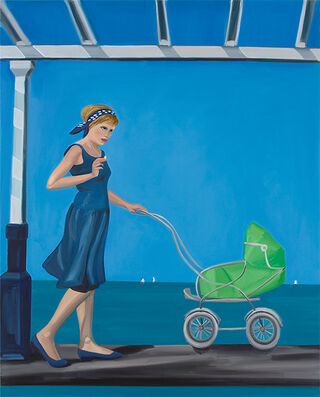Personality
Do Major Relationship Events Change Your Personality?
Differences in reaction may depend on ascribed meaning.
Posted October 17, 2022 Reviewed by Michelle Quirk
Key points
- Personality predicts relationship events moreso than relationship events predict personality change.
- Extraversion and openness are the two personality traits that most consistently predict the occurrence of relationship events.
- People show individual variations in their reactions to relationships events—depending on the meaning that they ascribe to the event.
Over the life course, people experience different relationship events, such as marrying or getting divorced. Relationship events are defined as time-specific transitions that indicate the beginning of a new status or the ending of a previous status. A status means here a specific position, role, or condition—for example, the role of being a mother or father.
Relationship events differ in that some events involve gains, while other events involve losses. A gain-based event is, for example, entering a new relationship, because the person gains the new status of being partnered. A loss-based event, on the other hand, is widowhood, because the person loses their partner. Characteristic for both types of events is that they often require new cognitive, emotional, or behavioral tendencies, such as finding and negotiating new roles and responsibilities after the birth of a child.

Relationship Events and Personality
Researchers have been interested in understanding how people’s cognitions, emotions, and behaviors are related to the relationship events that they experience. The observed selection effects suggest that people’s personality traits may predict relationship events because people select themselves in certain relationship situations based on their personality. For example, people with lower levels of agreeableness, compared to people with higher levels of agreeableness, are more likely to get divorced.
The observed socialization effects, on the other hand, suggest that the experience of a relationship event may contribute to personality development. For instance, people who get divorced become less conscientious over time, compared to people who do not get divorced. Thus, our personality traits may be shaped by our relationship events. However, the observed effects are often small and inconsistent across studies, meaning that different studies observe different associations between personality traits and relationship events. Therefore, our research team conducted a comprehensive analysis across three nationally representative household data sets to specifically test the associations between personality traits and relationship events.
A Comprehensive Analysis Across Three Data Sets
The study includes data from participants in three nationally representative household data sets— that is, in data sets from the United Kingdom, Australia, and Germany. Our research goal was to examine how personality traits are related to relationship events. Moreover, we wanted to explore whether people’s age could explain the so-far observed inconsistency in the effects. In other words, could it be that only people of younger ages get less conscientious over time when they get divorced but not people of older ages? To address these questions, large data sets with age-heterogenous samples are needed.
The findings indicated more selection effects than socialization effects, and the selection effects were stronger and more consistent than socialization effects. This means that personality more strongly predicts the occurrence of a relationship event than relationship events predict personality changes.
The two personality traits that most clearly predicted the occurrence of a relationship event were extraversion and openness: People high in extraversion tend to have higher levels of energy and positivity and tend to be more sensitive to rewarding stimuli; people high in openness tend to have higher levels of curiosity and creativity, tend to be more motivated to approach new experiences, and are characterized by being more open to change. Both traits tend to predispose people to select themselves in new relationship situations and to make new relationship experiences.
Against our hypothesis, the study observed very few age-specific effects, meaning that people of different ages are not more or less likely to experience certain relationship events based on their personality, and they are not more or less likely to change their personality based on the events that they experience.
Changes in Personality
The findings indicated that relationship events predict few changes in personality. This could mean that relationship events do not, indeed, change our personality. But, it could also mean that people do not consistently react to relationship events. That is, while one person becomes less conscientious after a divorce, another person might become more conscientious after a divorce. In sum, this would result in a null effect.
Therefore, more knowledge is needed to better understand these individual variations in response to a relationship event. First, it would be essential to account for the individual meaning and social script that is ascribed to a relationship event. For example, someone who sees divorce as a possible, almost natural, component of relationship trajectories may react differently to their own divorce than someone who sees divorce as a personal, or relational, failure. These different meanings may bring the divorcee into a different role and will likely guide them differently through the time following a divorce.
Second, it is important to gain further knowledge about the quality of the experience. For example, losing a relationship that was low in quality may have a different impact than losing a relationship that was high in quality. Finally, to better understand how relationship events may change people and their relationships, it is essential to assess these changes in vivo—that is, in people’s daily lives. For example, moving in with an organized partner may create different daily situations than living together with a less-organized partner, which, in turn, may lead to different changes in personality.
Effect of Relationship Events on Our Personality
Selection effects tended to be more frequent, stronger, and consistent than socialization effects. This means that personality predicts the occurrence of relationship events rather than relationship events predicting changes in personality. However, it is likely that people show individual variations in how they react to relationship events—depending on the meaning that they ascribe to the relationship events, the quality of the relationship, and the daily experiences that people make in response to the relationship event. Future research is needed to study these aspects to advance our knowledge about the interplay between relationship events and personality.
Facebook image: Oleg Kolesnyk/Shutterstock
LinkedIn image: Rawpixel.com/Shutterstock
References
Bühler, J. L., Mund, M., Neyer, F., & Wrzus, C. (2022). A developmental perspective on personality–relationship transactions: Evidence from three nationally representative samples. Journal of Personality, Advance online publication. https://doi.org/https://doi.org/10.1111/jopy.12757
Further Readings
Bleidorn, W., Hopwood, C. J., & Lucas, R. E. (2018). Life events and personality trait change. Journal of Personality, 86(1), 83–96. https://doi.org/10.1111/jopy.12286
Neyer, F. J., & Asendorpf, J. B. (2001). Personality-relationship transaction in young adulthood. Journal of Personality and Social Psychology, 81(6), 1190–1204. https://doi.org/10.1037/0022-3514.81.6.1190
Neyer, F. J., Mund, M., Zimmermann, J., & Wrzus, C. (2014). Personality-relationship transactions revisited. Journal of Personality, 82(6), 539–550. https://doi.org/10.1111/jopy.12063




